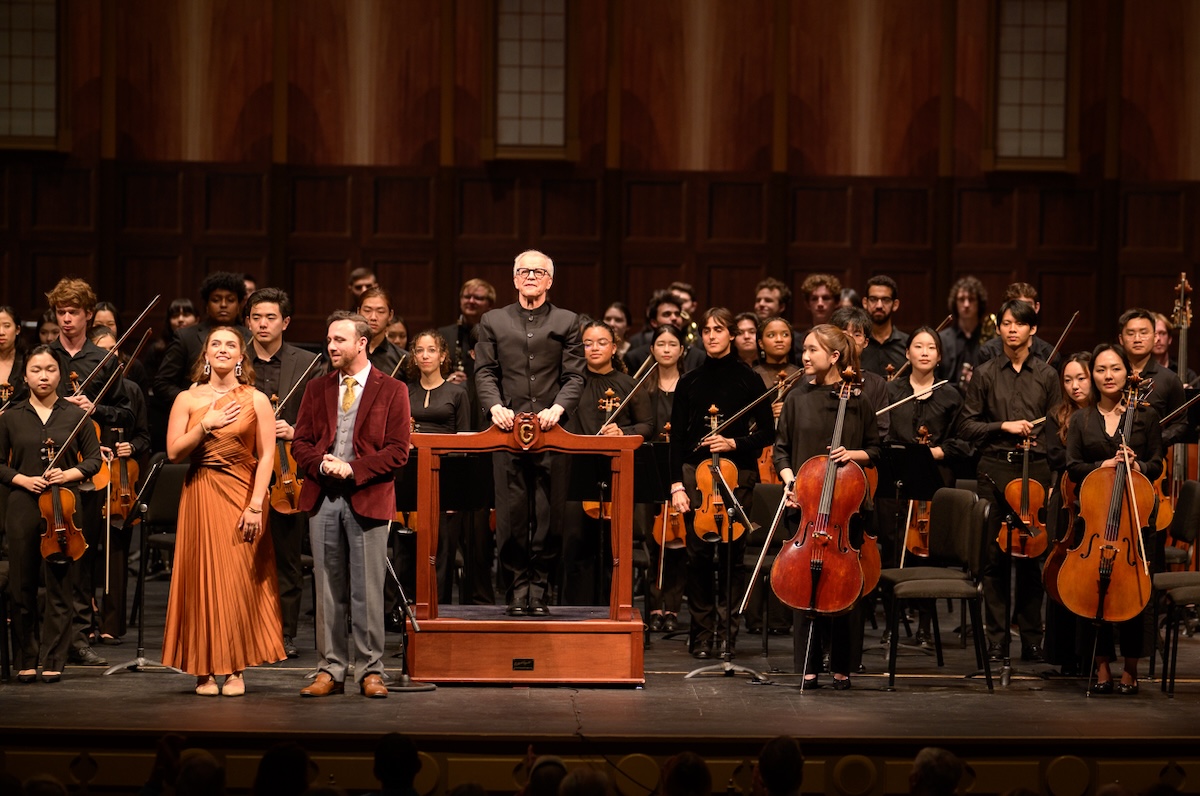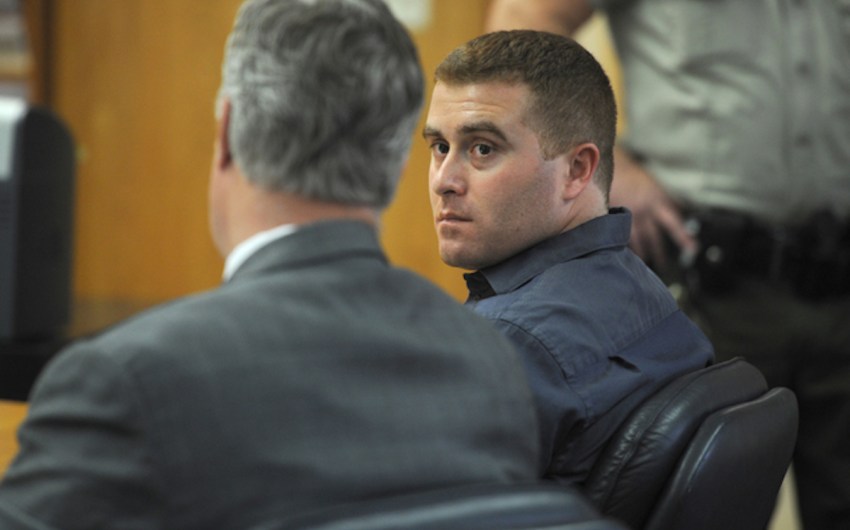Heroic Birth of a Short-Lived Orchestra
Music Academy of the West’s Academy Festival Orchestra, led by Maestro Osmo Vänskä, Kicked Off Summer Series in Santa Barbara with Wagner/Mahler/Sibelius Power Menu

In the beginning was the sonic swarm of a buzzing orchestral warmup. This was literally our first encounter with the fresh-faced young version of Academy Festival Orchestra (AFO), last Saturday night at The Granada Theatre, launching this year’s “Saturday at the Symphony” series of the Music Academy of the West.
Noted maestro Osmo Vänskä was on hand to lead the newly configured orchestra, made up of fellows in this year’s Academy through a bold and craftily integrated program of Wagner, Mahler, and Sibelius, and the orchestra delivered. No great surprise there. By concert’s end, a few wrinkles notwithstanding, we had that familiar satisfying — and expected — impression: It’s yet another fine young orchestral ensemble in town this summer, boding well for the remaining four concerts of the festival.
Shuana Quill, the new head of the Music Academy, introduced the concert, one endowed in honor of the late Larry Rachleff — conductor of many an opening concert by many a new AFO aggregate in recent years.
Where to begin? Wagner’s Overture to Die Meistersinger von Nürnberg proved a very fine place to start, and to test the orchestra’s mettle. Wagner’s epic opera, and brighter-spirited compared to such later efforts as Tristan und Isolde and the Ring Cycle, has provided orchestral repertory a sweeping, heroic overture as a signature work on its own — and a suitable concert opener, played with due fervor and crispness at the Granada.
Mahler’s Songs of a Wayfarer, inspired by Wagner’s musical and procedural language (composer as librettist) segued naturally out of Meistersinger, serving the added function of showcasing gifted fellows from the Music Academy famed voice department. Mahler’s four-song cycle, dealing with the composer’s own angst over unrequited love for a soprano, focuses its mournful emotional power on songs for both female (assured and rich-toned mezzo-soprano Meg Brilleslyper) and male (characterful baritone Michael Segura) voice/personae.
Both singers projected sensitivity and force in proper measure, with fidelity to the text — and the implied message embedded in Mahler’s yearning late romantic/pre-modernist score. On the final song “Die zwei blaue Augen von meinem Schatz” (“the two blue eyes of my darling”), Segura eased into the delicate balance of its finale, alternatively pensive and flecked with cautious hope — a fatalistic sigh to close.

Post-romantic sensibilities shifted northward after intermission, with Sibelius’ Symphony No. 2, one of the works viewed as a statement of independence by the proudly Finnish composer — and national hero in the making — whose “Finlandia” became the nation’s anthem.
Sibelius, whose reputation gained a regional upward nudge with the championing of Finnish maestro Esa-Pekka Salonen during his years helming the Los Angeles Philharmonic, plays well in the contemporary orchestral atmosphere, one which generally favors ear-friendly yet challenging orchestral statements. That careful blend of melodic and innovative ideas was heard once again in this fine reading: no doubt, Finnish conductor Vänskä’s intimate understanding of the music’s character helped interpretive matters.
The four movement, roughly 45-minute long symphony opens with a restrained boldness, with the composer’s familiar fluidity, sentiment, and an air of detached coolness. The andante movement moves from pizzicato cellos in circular melodic motions, working into stormy busts, shifting from such stern stuff to the brighter emotional prospects and bustling energy of the vivacissimo movement.
Diverse forces — which we might read partly as statements of national pride and the rumbling of repressed independent spirit — galvanized into a heartfelt melodic closing theme.
In all, it was a pleasure to hear this relatively seldom-performed gem, and in good hands from the podium throughout the packed stage of young musicians. AFO 2024 is another fine orchestra to behold and savor, blessed with wisdom and tautness beyond its collective years.
This year’s particularly alluring orchestral programming warrants extra attention, including this coming Saturday (June 29), when fast-rising conductor Anthony Parnther leads the AFO in that consummate modernist masterpiece, Stravinsky’s Rite of Spring (so good, it reputedly sparked a riot at its 1913 Parisian premiere). Also on the left-of-conventional program are Florence Price’s Symphony No. 3 and Los Angeles–based composer Joan Huang’s Tujia Dance.
Don’t expect a riot at the Granada this Saturday but do expect some mental fireworks to be detonated.
Premier Events
Sun, Dec 22
11:00 AM
Santa Barbara
Mosaic Makers Market – Holiday Market Finale
Wed, Dec 25
6:00 PM
Santa Barbara
FREE Contra Dance X-mas Day💃Corwin & Grace band6-9
Sun, Dec 22
11:00 AM
Santa Barbara
Mosaic Makers Market – Holiday Market Finale
Sun, Dec 22
2:00 PM
Santa Barbara
Santa Paws Holiday Party – A Howliday Celebration
Tue, Dec 24
2:00 PM
Santa Barbara
Brass Bear Christmas Eve Buffet
Tue, Dec 24
5:00 PM
Santa Barbara
Christmas Eve at the USSB
Wed, Dec 25
5:30 PM
Santa Barbara
Christmas Dinner at El Encanto
Fri, Dec 27
6:00 PM
Solvang
New Year Disco Ball Paint & Sip
Fri, Dec 27
9:00 PM
Santa Barbara
Film Screening: “Indiana Jones and The Last Crusade”
Sat, Dec 28
7:00 PM
Lompoc
Rosie Flores & Grey DeLisle + Special Guests LIVE
Sat, Dec 28
7:00 PM
Carpinteria
Family Comedy Night at The Alcazar
Sat, Dec 28
7:00 PM
Santa Barbara
The Temptations at Casa De La Raza
Sun, Dec 22 11:00 AM
Santa Barbara
Mosaic Makers Market – Holiday Market Finale
Wed, Dec 25 6:00 PM
Santa Barbara
FREE Contra Dance X-mas Day💃Corwin & Grace band6-9
Sun, Dec 22 11:00 AM
Santa Barbara
Mosaic Makers Market – Holiday Market Finale
Sun, Dec 22 2:00 PM
Santa Barbara
Santa Paws Holiday Party – A Howliday Celebration
Tue, Dec 24 2:00 PM
Santa Barbara
Brass Bear Christmas Eve Buffet
Tue, Dec 24 5:00 PM
Santa Barbara
Christmas Eve at the USSB
Wed, Dec 25 5:30 PM
Santa Barbara
Christmas Dinner at El Encanto
Fri, Dec 27 6:00 PM
Solvang
New Year Disco Ball Paint & Sip
Fri, Dec 27 9:00 PM
Santa Barbara
Film Screening: “Indiana Jones and The Last Crusade”
Sat, Dec 28 7:00 PM
Lompoc
Rosie Flores & Grey DeLisle + Special Guests LIVE
Sat, Dec 28 7:00 PM
Carpinteria
Family Comedy Night at The Alcazar
Sat, Dec 28 7:00 PM
Santa Barbara

























You must be logged in to post a comment.